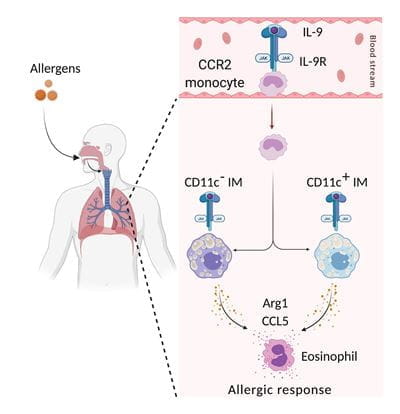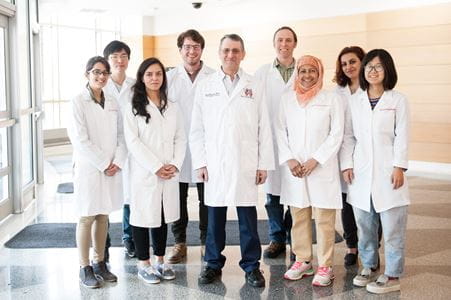INDIANAPOLIS—Researchers at Indiana University School of Medicine Department of Microbiology and Immunology have made an important new discovery about how a particular molecule could improve lung function for people with asthma and food allergies.
“Millions of children and adults in the United States have asthma, which results from allergen-induced inflammation in the lungs,” said Mark Kaplan, PhD, chair of the Department of Microbiology and Immunology and the senior author of the study. “The ability of cells to communicate with each other is critical in the development of inflammation and occurs through the release of molecules called cytokines.
One of these cytokines, interleukin-9 (IL-9), has been found in patients with asthma and food allergy, but how IL-9 promotes inflammation has been unclear. In the study published recently in Science Immunology, researchers define one of the cell types, called the lung macrophage, as a major target of IL-9.

They found allergic lung inflammation decreased when the receptor for IL-9 was missing and the macrophage is critical for IL-9 function in the allergic lung. They also defined downstream effectors of IL-9 in the macrophage, identifying enzymes and additional cytokines that are required for the development of allergic inflammation, and found a correlation between IL-9 and the downstream effectors with the diagnosis of asthma in patients.
“This work is a significant advancement in our study of allergic lung inflammation,” Kaplan said. “We can use this information to further study the macrophage populations and determine how it could be a potential therapeutic approach for treatment of asthma and other types of lung inflammation.”
The study was led by Yongyao Fu, PhD, MS, a former graduate student and now an adjunct assistant scientist in microbiology and immunology at IU School of Medicine and a scientist at Genentech in California. Read the full publication in Science Immunology.
Learn more about microbiology and immunology research at IU School of Medicine.
###
About IU School of Medicine
IU School of Medicine is the largest medical school in the U.S. and is annually ranked among the top medical schools in the nation by U.S. News and World Report. The school offers high-quality medical education, access to leading medical research and rich campus life in nine Indiana cities, including rural and urban locations consistently recognized for livability.




